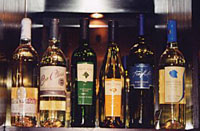
The spread of beer, wine and liquor in Yemen [Archives:2006/914/Reportage]
January 23 2006
 |
[email protected]
As people in Yemen undergo many changes in their way of life, and the country eagerly tries to accept from other cultures the good they may possess, something goes unexpected. Not long ago, and during the British Occupation in the southern part of Yemen, beer, wine along with other alcoholic drinks were gaining fame, and spreading like never before in this poor middle eastern country.
Twelve years ago the National Brewing Company or the Seera beer factory was burned to the ground by northern troops during the North-South civil car. Every bottle of beer was broken. The beer factory was the first and only beer factory in Yemen. Tough procedures were taken place to insure that the existence of alcohol will never have roots in the country's future.
Unfortunately, changes happened faster then one expected, not only in alcohol consuming, but other concerns to society as well. Spreading in our conservative society has also included adultery, prostitution, alcohol drinking, and the use of illegal drugs. The price for the mentioned could reach as high as one-month salary for a usual laborer in a single occurrence. “People doing drugs and alcohol are either from rich families, tourists, or those Yemenis who were living outside the country,” said Mohamed Mujahed, a citizen who is surprised at the sudden change in life in Yemen. “Life has changed so much over the last five year. It's hard to imagine how things will turn out to be in the years to come”, he added.
According to local sources, although its not the trend alcohol has also been seen consumed during Qat sessions to strengthen the effect of Qat. One alcohol user estimated that over 800 bottles of beer are sold on a daily basis in one hotel alone in the capital Sana'a. Yemeni law allows visitors to carry the maximum of one liter of alcoholic beverages, which include (beer, wine or liquor) when coming to Yemen. Nowadays foreign travelers feel more ease as beer and wine are found in almost every part of the country and making the burden of bringing alcohol to Yemen easier.
In Sana'a, it has been a common issue to recognize the drinking of beer or liquor in hotels and nightclubs. From there it is sold to locals who spread it throughout the capital. Beer is also known to be manufactured locally and secretly in two places in the capital Sana'a. Al-ka'a and Nukum zones are known to be hubs for homemade liquor and alcoholic beverages.
The government has not taken a serious stance is limiting such a social destructive matter, which by time could change the structure of our once conservative society. Recently in Al-ka'a zone tens of youth surrounded a house of a man suspected selling alcohol to locals. According to sources the man has been selling alcohol for over 20 years with the knowledge of government officials, and yet has not been fought or stopped.
In the capitals Shumaila zone, Sana'a, a local citizens complains that every morning when he wakes up, he finds an empty 32-ounce bottle of liquor thrown in front of his house. When trying to investigate in the case, he revealed that neighbors used to drop the bottle in front of his house at 3am in the morning. When complaining to the police, he was ignored and given a difficult time.
Jalal, a 90-year-old Yemeni citizen from Damt area in Thale'e governorate admitted on consuming a case of 12 bottles of alcohol on a weekly basis. When asked of how he transports the bottles he said “it's as easy as transporting Qat from one place to another”.
Westerners living in Yemen, view this matter from a different perspective, ” In the just religion of Islam, it does not forbid people following a different religion from drinking alcohol, on condition that it is not consumed in public”, said a native European who preferred to stay anonymous. “Jews living in Medina during prophet Mohammed's era used to drink alcohol in their homes and the prophet did not stop them from doing so. I don't think Christians drink alcohol in the open but rather do so in their homes or private hotels”, he added. In reality, Islam does not forbid non-Muslims from drinking if done so privately and away from public eyes. The punishment for drinking alcohol in Islam is 40 lashes, while in many Arab countries the punishment for such a violation would be imprisonment or a fine.
Most addicts to alcohol admit that gulf tourists played a big role in spreading beer in Aden. Tourists from gulf countries that include Saudi Arabia, come to Aden to freely become drunk without being censored or watched. “When you go to certain hotels in Aden, you will find that gulf tourists are the most frequent customers” said saleh Nasser, a resident of Aden. “Unfortunately, Yemenis like to imitate anything that gulf citizens do. They look at them as more modernized people”.
Despite the weak infrastructure of the government and the insincerity of officials, the spreading of drugs and alcohol exists openly and is not being controlled. Citizens fear that Yemen is falling into a deep hole, which will take generations to solve.
——
[archive-e:914-v:14-y:2006-d:2006-01-23-p:report]


